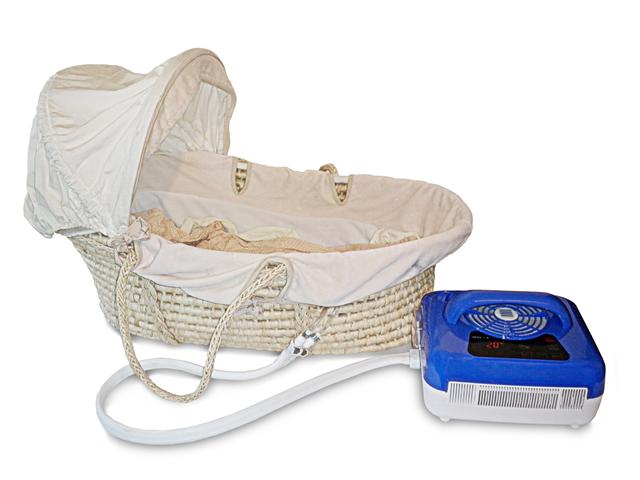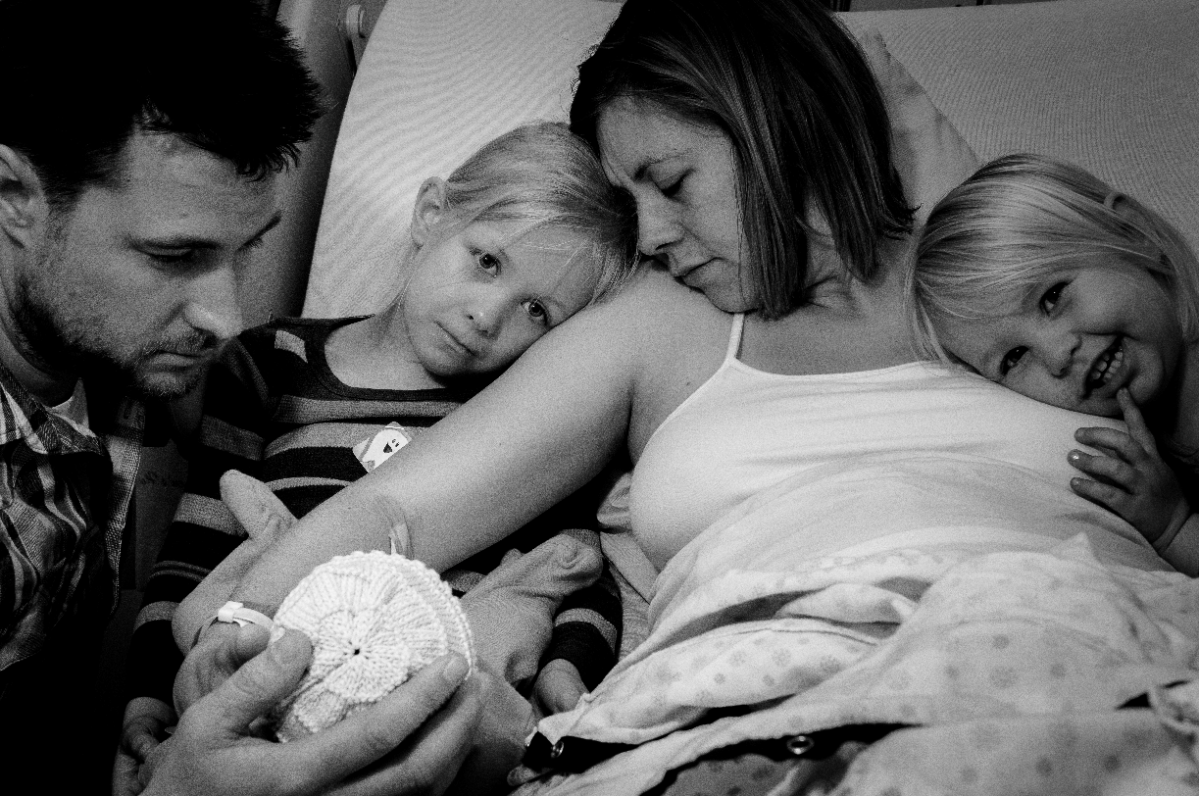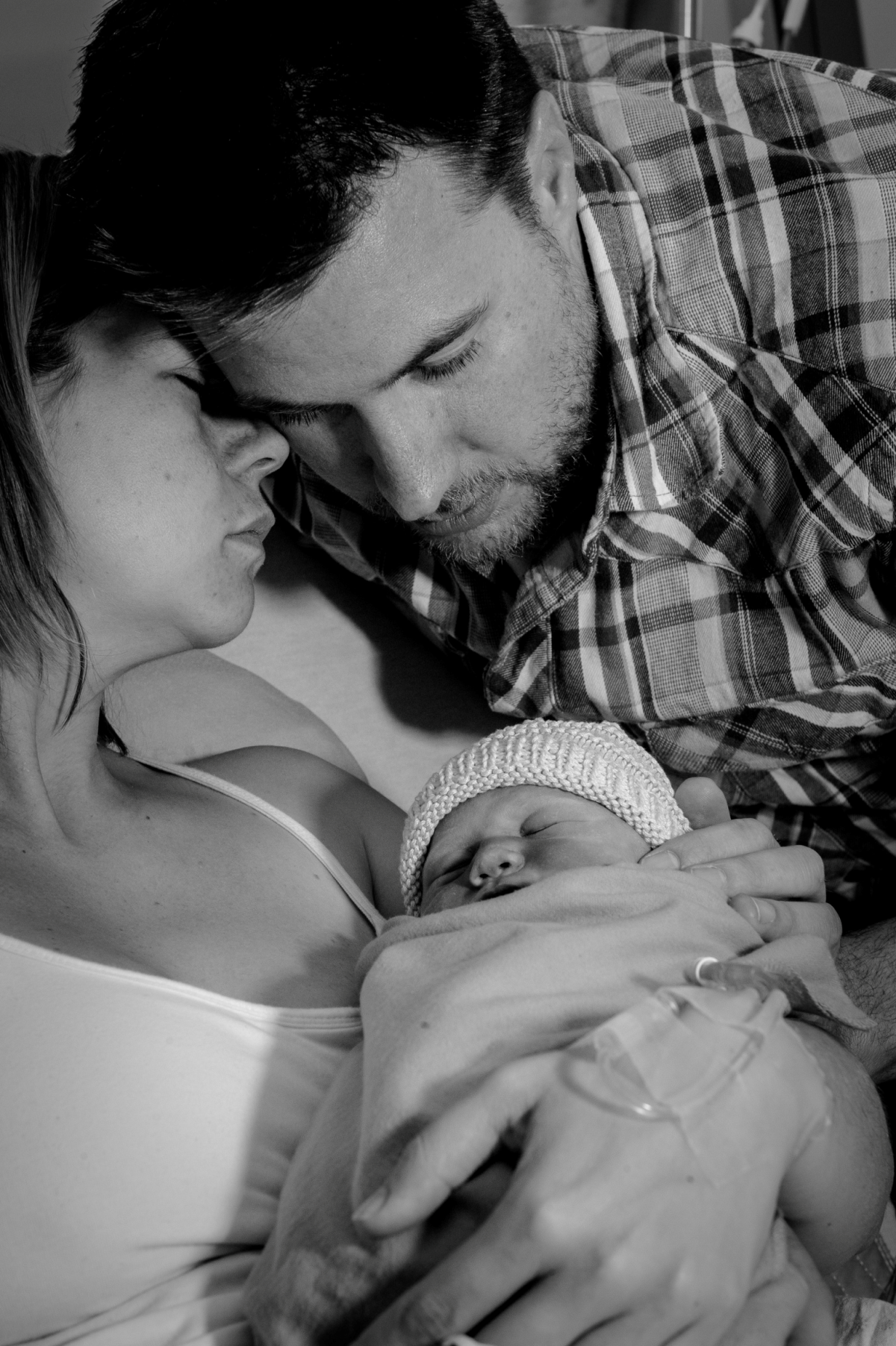VANCOUVER — Caitie Grange gave birth to her daughter Elizabeth Blake Shannon on April 22, 2015 at BC Women’s Hospital. Otherwise a healthy baby, little Elizabeth died in utero due to a knot in her cord.

“For some reason, when it’s a small baby, people just feel like ‘oh you’ll have another one and that will fill the hole.’ I’ve even had comments like that with the stillbirth, it was bad enough when it was miscarriages, but I’ve had people say to me when they’ve found out I’ve lost a baby, ‘well, another baby will come along,'” she said.
Grange said that due to some complications, she was followed closely during her pregnancy by doctors at the hospital but there was no reason to believe anything was seriously wrong.
“Four days after my last ultrasound at Women’s, I woke up to go to work and I felt her moving, like in the morning,” said Grange. “But I also felt that she had dropped down, I could feel that the pressure was off of my ribs.” Having had two other daughters who dropped down around the same time, Grange said she figured Elizabeth was just getting ready to be born.
“She didn’t move the entire 40-minute drive to work and that, by the time I got there I was feeling pretty nervous.”
Grange started her teaching job, but by 9 a.m. she still had not felt Elizabeth move.
“I couldn’t even focus on what I was doing in the class,” she said. “I kept pushing my stomach trying to get her to move. By about 9:45 I knew that I had to see a doctor because I hadn’t felt her move in about two hours, which isn’t a terribly long time but I guess I knew something was wrong.”
Upon arriving at BC Women’s Hospital and being checked by the doctors, Grange knew Elizabeth was dead.
“The doctor eventually looked at me and said ‘I’m sorry mama, her heart’s not beating anymore.'”
Grange and her husband decided it was best to deliver Elizabeth by C-section later that day. When Elizabeth had dropped down, ready to be born, a knot had formed in her cord. “She had dropped down, I guess, and it had tightened and that was that,” said Grange.
Olivia
Coquitlam resident Briana Stevens does not yet know what happened to her baby Olivia.
Everything was fine with her pregnancy until about four-and-a-half months, when she and her partner were told Olivia was not growing as fast as she should have been. They went back and forth to BC Women’s Hospital over the next few weeks and doctors said Olivia may have a heart defect. “We went for an ultrasound, five days before her heart stopped, and they said that ‘oh she looks fine, she’s doing great and with the heart defect, we’re not even really sure yet,'” said Stevens.
However, one night Stevens couldn’t find Olivia’s heartbeat on her home Doppler fetal monitor device.
- Three B.C. men fined, banned from hunting after killing pregnant deer
- B.C. child-killer’s attempt to keep new identity secret draws widespread outrage
- Inquest hears B.C. hostage was lying on her captor before fatal shooting
- ‘We’ve had to make a 180’: What Oregonians say they got wrong with decriminalization
“So I had to go into BC Women’s in the morning, early in the morning on the 2nd of March, and then they did an ultrasound and they checked for a heartbeat and they said there wasn’t a heartbeat so I had to get induced and then deliver her,” said Stevens.
She was 25 weeks pregnant.
Due to so many patients waiting to get induced, Stevens opted to go to Royal Columbian Hospital in New Westminster to deliver Olivia. But she was surprised to find she still had to be on the maternity ward.
“We were in the regular maternity ward, so there’s other women in there who are giving birth to their healthy, live babies,” said Stevens. “So while you’re there, going through labour, you can hear babies screaming and women delivering and stuff like that so that was kind of hard too.”
‘It’s uncomfortable to talk about’
There were 2,818 babies stillborn in Canada in 2011, the last year for which stats are available. In B.C. there were 217. Both Grange and Stevens said what surprised them after their experiences was how many people had gone through a similar event.
Grange said that she learned her neighbour’s baby died at one day old. “And she said ‘people just didn’t talk to me about it, I didn’t talk about it.’ And that was her experience, it was just too uncomfortable to talk about it, it was just too taboo.”
But, she said, her neighbour found it therapeutic to talk to her about what happened.
“And that just broke my heart, because here she is, she lost a baby three years ago and this is the first time she felt like somebody was ready to listen,” she said.
Stevens said she thinks part of the reason is there is some shame associated with having a stillbirth.
“I think people are ashamed and I can understand some of that shame,” she explained. “I think if that shame was taken away, a lot of women might be able to find avenues to speak up more.”
‘It’s every parent’s worst nightmare to lose a child’
In the hospital the families are given time with their babies before they have to be taken away.
“We had a really great experience,” said Grange. “That sounds awful to say that in the same sentence but considering what happened I think we probably had one of the better experiences.”
As soon as Elizabeth was born, the couple was assigned a social worker.
The first thing she did was arrange a photographer to come in and take photos. She made sure plaster casts were made of Elizabeth’s hands and feet. The Granges also got a lock of Elizabeth’s hair and clothes to dress her in.
“In hindsight, most people did not have such a good experience,” Grange said. “It’s not the norm and it should be because honestly it’s every parent’s worst nightmare to lose a child.”
“The fact that she came prepared with ways we could form these memories of Elizabeth was really important.”
Stevens said her experience at Royal Columbian Hospital was “as good as it could be.”
They were not able to get a professional to come and take photos of Olivia so they took their own. “Most staff, most nurses were amazing.”
There were a few staff though, she said, that she felt were insensitive. “You could tell a couple needed a little more bereavement training maybe.”
Grange said one nurse asked her partner if she knew breathing techniques, something which wouldn’t be necessary until later in her pregnancy.
“With all the emotional pain and everything else, I was kind of in shock about how painful it was and I hadn’t done any Lamaze or labour classes yet. So I remember thinking ‘how rude of you’ but I was in too much pain to say anything. Like how dare she say that? People need to be a little more careful.”
Loraine Jenkins, executive director for the Maternal, Infant, Child and Youth program at Fraser Health, said they are very sorry to hear about Stevens’ experience.
“We aim to provide uncompromising care for our patients that results in a positive experience, even in such heart-breaking moments,” she said.
“We offer perinatal loss education sessions to our staff, and all nurses who deliver babies receive specialty training as part of their education.”
Cooling cots
Jens Locher runs the BC Childloss Support Network. He and his wife had two sons in 2011 and 2012. Marlon lived for two days and died neonatally. Tobias was stillborn at 35 weeks.
Locher has been helping to raise money for St. Paul’s Hospital in Vancouver to get a cooling cot or a cuddle cot, a device that keeps the deceased baby cool, allowing the family to spend more time with the baby.
When his children died, he said the hospitals did not have a cooling cot, and instead placed the bodies on bags of ice.
“Which, you know, works, but it’s not really the greatest experience in terms of putting your baby’s body on ice,” he said. “And it doesn’t really help that much with cuddling — you try to hold your baby and you have to juggle ice bags.”
Stevens said when Olivia was born, they only had about two hours with her as Royal Columbian Hospital did not have a cooling cot. “The nurse kept coming in trying to take her away, over and over,” she said. “And I was like, ‘Can we have more time, I need more time, I need more time.’ We just kept asking for more time, but you could tell she was, you know, the natural processes of death were happening.”
Stevens said her only regret was that she couldn’t stay with Olivia longer.
Help raise money for a Cuddle Cot in a B.C. hospital.

What happens after the hospital?
“I have good days and bad days,” said Stevens. “Some days I wake up and I won’t want to do anything, but I do feel like there’s lots more good days than bad days.”
She and her partner had a public health nurse come to see them a few days after Olivia was born, but Stevens said she wasn’t ready to even pay attention to what resources were available to them.
When she tried to reach out to support services in the coming weeks, she found many dead ends and that she was ineligible for many of the programs.
She has seen a counsellor at BC Women’s Hospital once so far, but said that is just not enough.
“I feel like there are some resources but not enough for how prevalent this is,” she said. “There are people like me, sitting at home, unable to get out of bed. Or for example, going through traumatic episodes thinking about the experience they had delivering their lifeless baby.”
“To call people and say ‘I need help, I need support,’ and for them to say ‘sorry you’re not eligible’ or ‘we can’t help someone in your situation, good luck,’ it’s just really disheartening.”
Stevens said without online support groups and sharing her experience with other parents, she would feel very empty.
“I remember being on my phone all day just reading and sharing my experience and asking for advice and reaching out because there hasn’t been much else.”
Locher said the BC Childloss Support Network is a peer-to-peer service where parents can connect and share their experiences.
“We listen and provide reassurance and hopefully let people know they’re not alone in this,” he said. “People find some help by talking to other parents.”
Locher would like there to be a standard of care in hospitals to make sure families dealing with stillbirth get the support they need and don’t fall through the cracks.
“And I think there’s an immediate need, when it happens, because you’re really vulnerable and actually traumatized at that time, where the hospital has a huge role to play, but the grief really stays with you for life,” he said.
Jenkins said staff at Fraser Health are trained to provide and support to grieving families.
“Our care teams are trained to support mothers and their families through their tragic loss,” she said. “Two social workers, with expert knowledge relating to perinatal loss are also there to provide comfort and support during this time. Families are also provided with an information package with several resources that they can take with them and read again at home.”
“We also support the family in taking pictures and footprints so they can have some memories of their baby, and place them in a memory box. All of our nurses are mentored in providing appropriate care for our grieving families.”
Sharing memories and stories
Locher said he and his wife still celebrate their two sons’ birthdays, but only invite a small group of close friends to join them.
“The bereaved parents do want to talk about their children and keep their memories alive, because that’s all they have left. The others get to celebrate the milestones and the birthdays.”
As time passes, it can be more important for parents to have opportunities to talk about their children.
“When you get pregnant, you have that dream and that future for the baby, and that’s taken away… You want to know what they would have become, what their laugh sounded like, or just little things like that,” said Stevens.
Grange said she might like to get pregnant again one day, but she would like to see more research done into what causes stillbirth and the fact so many stillbirths remain unexplained.
“For some reason, when it’s a baby that died in utero or a baby that died right away, it’s like this idea that you can just have another one,” she said. “From my experience it is not a comforting thought. Would I like to have more children? I think I would. Is that going to replace Elizabeth? No. It’s not going to ease the pain of her passing.”
“She was a real person and sharing her is helpful.”
Do you have a story you’d like to share with us? Let us know below:





Comments